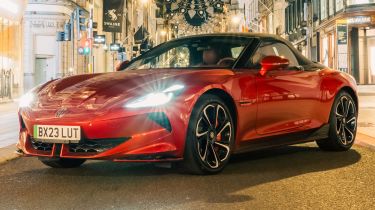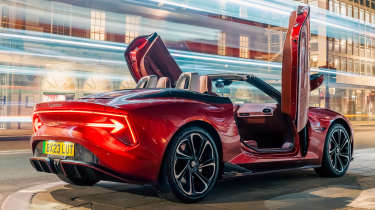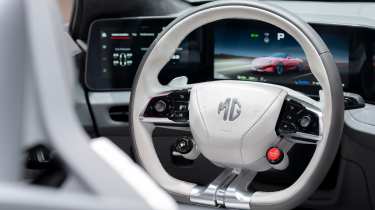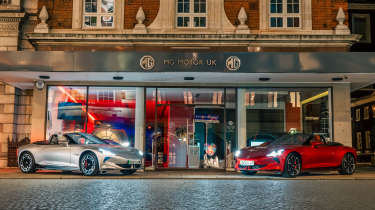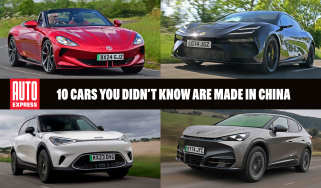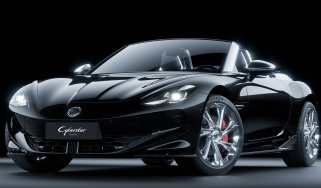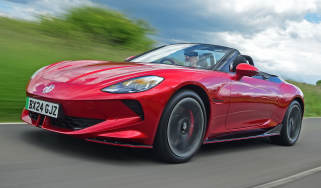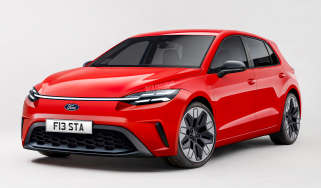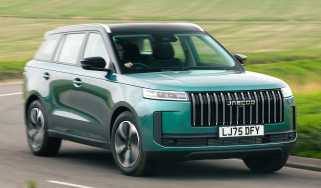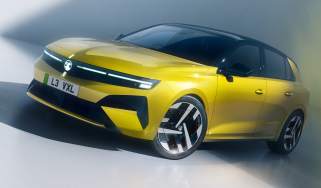New MG Cyberster all-electric roadster: full specs and £55k price tag
The Cyberster is now available to order with first deliveries expected in August
It’s been three years since MG wowed us all with the Cyberster concept and now, finally, we can reveal that the production car has gone on sale in the UK. The open-top EV is scheduled to hit the British market just in time for summer.
We had full specifications revealed back in March at the 2024 Geneva Motor Show, but now we can announce the Cyberster will be priced from £54,995 in ‘Trophy’ trim, rising to £59,995 for the range-topping ‘GT’.
The Trophy and the GT feature different powertrains and levels of equipment, but they share some key features such as the Cyberster’s scissor-opening, Lamborghini-style doors. The exterior design and the electrically-operated canvas roof - which can open and close in 15 seconds at speeds up to 30mph - are also common across the range.
Ignoring the original low-volume Tesla Roadster, the MG Cyberster will hold the title of being the first bespoke, ground-up all-electric roadster. An expression of intent by MG that sees itself as a true innovator, and one that will appeal to buyers not just for objective reasons, but on the grounds of desire. There are all-electric drop-tops coming, with the Maserati GranCabrio Folgore and Polestar 6, but for now the MG sits alone - especially at this price point.
The Cyberster will be offered in the familiar Dynamic Red launch colour and will be joined by New English White, Camden Grey and Cosmic Silver, with Inca Yellow offered as a ‘premium’ option. The sports car will be offered with a choice of a black or red roof.
MG Cyberster specifications
Just two trim levels are offered at launch - the Trophy and the GT. As standard, the Trophy gets 19-inch alloy wheels and the same exterior design as the GT, with LED lights from and rear.
The interior features a wraparound three-screen layout on the dash, with a 10.25-inch driver’s display joined by two seven-inch displays. Another screen mounted on the centre console operates the dual-zone climate controls. Android Auto and Apple CarPlay connectivity is standard, along with an eight-speaker Bose sound system, ambient lighting, a 360-degree parking camera and twin USB ports.
The faux-leather sport seats can be specified in grey with white accents or black with red accents. The central armrest opens up for additional storage space, which is just as well because the boot has a compact 249-litre capacity.
As for the Cyberster GT, you get 20-inch wheels wrapped in Pirelli P Zero tyres to help manage that car’s extra power. Both cars get the same safety equipment thanks to the ‘MG Pilot’ safety system. This includes lane change and lane keep assist, adaptive cruise control, blind spot detection, active emergency braking with pedestrian and bicycle detection, traffic jam assist, intelligent speed assist and adaptive headlights.
MG Cyberster battery, range and performance
The Cyberster runs on an all-electric platform with a large battery pack fitted under the cabin floor.
The Trophy gets a single motor producing 335bhp and 475Nm of torque, a 0-62mph time of 5.0 seconds and a top speed of 121mph. Power comes from a 77kWh battery, which is capable of 316 miles on the WLTP testing cycle.
The dual-motor GT comes with the same 77kWh battery, but with 501bhp and 725Nm of torque heading to all four wheels thanks to a dual-motor set up. This enables a 0-62mph time of 3.2 seconds and a top speed of 124mph. MG says that makes it the “fastest accelerating and most powerful production car to have worn the iconic MG badge”. With the onus on performance rather than efficiency, range takes a hit compared to the single motor version, with the dual-motor topping out at 276 miles (WLTP).
Charging the Cyberster takes 38 minutes from 10 - 80 per cent with a maximum 150kW DC charge rate. Regeneration of the battery can take place while driving through the Brembo brakes with three modes of regeneration severity to choose from.
MG Cyberster design and scissor doors
Carl Gotham, head of SAIC’s advanced design studio in Marylebone, spoke to Auto Express regarding the design process of the Cyberster. “This is a big moment for MG, so it has to make a big impression,” he tells us. “We wanted something that was going to stand out. Something that wasn’t too meek or demure.” Gotham and his team of 20-or-so designers were given some extraordinary freedoms in the car’s overall design and packaging.
Thanks to the flexibility granted by electric powertrains, elements such as the long bonnet and short rear deck were able to be realised, tapping into those traditional British sports-car proportions, but they needed to do so in a thoroughly contemporary style. “We’re not trying something to reinvent this typology, or do something completely alien,” Gotham says. “This is an electric car, but we didn’t want to feel too attached to the technology, so as not to feel too stark or too cold. We wanted this car to feel a little more passionate.”
The nose is long, low and sculpted, with a heavily contoured bonnet sitting above carefully considered openings that are functional, but don’t directly reimagine the historic MG grille design. A huge MG badge, which will be illuminated in certain markets, is flanked by two modern headlights that create a dramatic daytime-running-light signature. From these, there’s a single line that then folds over the front wing and onto the doors to create the main character line along the car’s flank.
A striking feature that will make production are Lamborghini-style scissor doors, an element usually reserved for the most extreme supercars and hypercars. While not a priority for legacy markets such as the UK, this was an essential element that MG wanted to integrate to really get customers in emerging markets talking – and it certainly makes a statement.
Along the side of the car, we perhaps see the team’s most innovative design element in the blacked-out body sections that sit right up at the window line. This use of black bodywork tricks the eye into thinking the sheet metal is more slender and more curvaceous than it actually is, bringing the production model closer to the more extreme Cyberster Concept. This visually thins the bodywork just at the point in which the rear haunch begins over the wheels, exaggerating these lines. It’s a very clever, and effective, way of bringing some of the Cyberster Concept’s wilder design elements to the road.
The rear is where Gotham and his team left the classic British sports car behind, instead adopting a design that links the Cyberster with its fellow EV models in the MG range. The squared-off rear end is framed in a dramatic LED lighting element, with two further arrow-shaped elements within the sculpted interior surfaces. As well as being a literal turn signal, they also gently reference the Union Flag, albeit in reverse.
The electrically powered fabric roof is a quick and simple z-fold design, with the front section forming the tonneau when stowed. Underneath the fabric is a semi-rigid structure to improve roof-up refinement and security when parked.
MG Cyberster interior and technology
The interior was designed by the central SAIC design team in Shanghai, who came up with a tech-heavy cabin that was inspired by gaming. The controversial yoke steering wheel is still only under consideration for the UK, but will be available in overseas markets.
The dash is dominated by four digital interfaces. A three-piece screen displays all the driver information, infotainment controls and driver-assistance tech. Gotham says: “We’re trying to design for China, which is a very technology-driven market that’s more obsessed with the user experience, where you’re in traffic all the time. So the need to have a relatively entertaining space comes up very often. From a British perspective, we don’t want too many distractions.”
The smaller, portrait-orientated screen on the dash is reserved mostly for auxiliary functions and the climate control. Next to it is a stack of drive-selector buttons, with some touch-sensitive switches to control the drive modes and commonly used features such as the heated seats. Because this is still an early indication of the future road car, this interior is considered to be around 90 per cent production-relevant, so we expect some small changes to the layout come series production.
Cyberster from concept to reality
The Cyberster Concept was designed at SAIC’s London studio as the ultimate reimagination of the MG roadster. Its design came by bridging the gap between MG’s heritage and a modern future, one inspired by gaming and future tech.
There have been some big changes in designing the road car, including removing the LED stripe along the side and a more realistic set of proportions. But remarkably most of the concept’s design elements have made it onto the production model, including its driver-focused interior and scissor doors.
In the market for a drop-top? These are the best convertibles on sale right now...
Find a car with the experts
